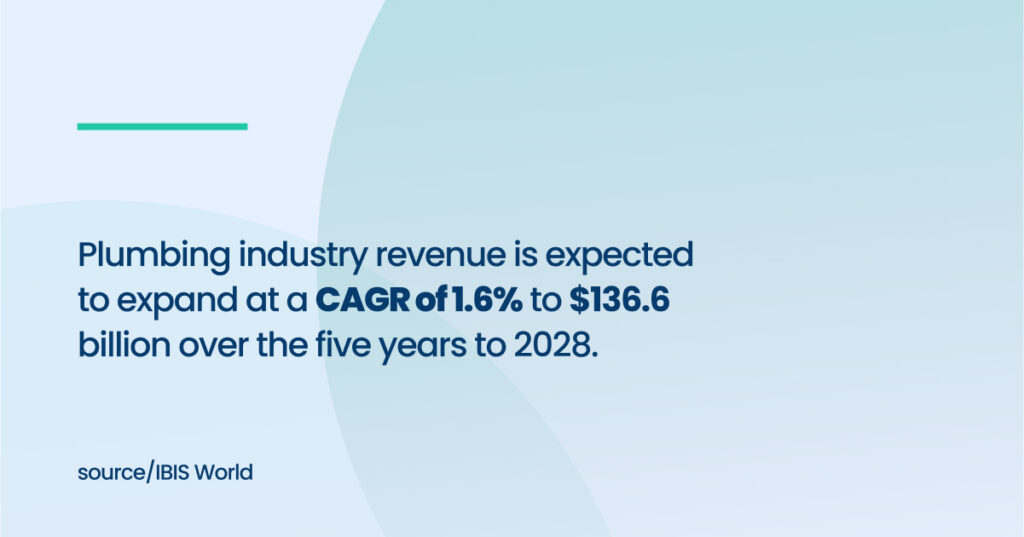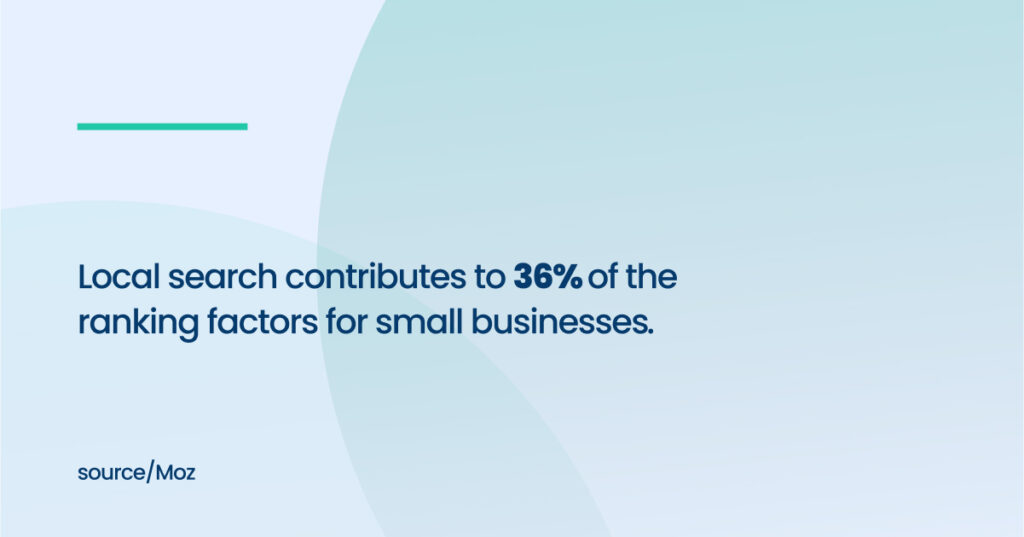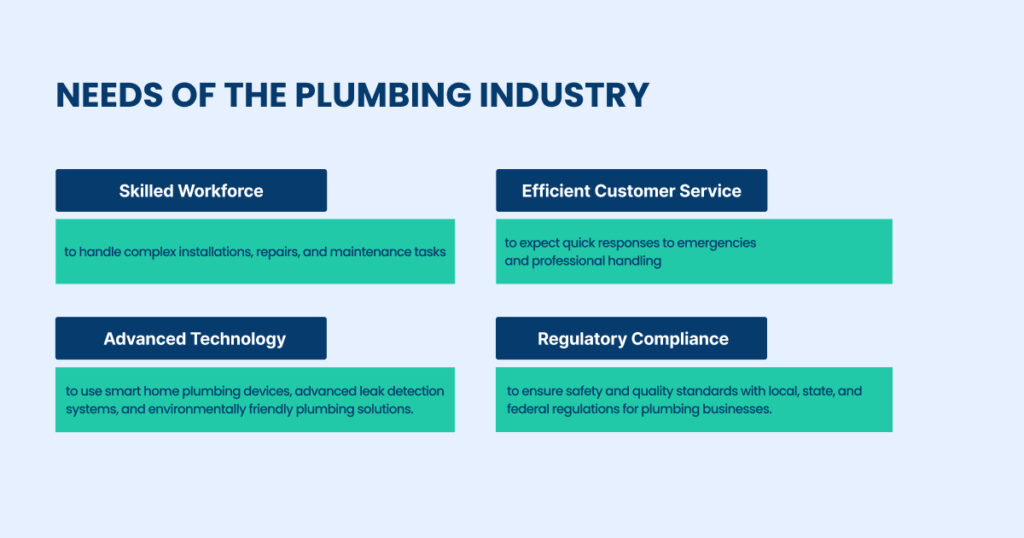What would you do if you were called by the potential client to assist him? A broken pipe had flooded the basement.
Of course, you need to find the best solution to offer your customer and ensure his satisfaction.
According to IBIS World, general plumbing services have grown as a share of revenue through the end of 2023, largely including essential repair services that cannot be delayed.

In this blog post, you will learn how to make your plumbing business stand out with smart marketing strategies.
We will explore innovative techniques to engage prospective customers and enhance your brand visibility.
The Essential Work and Expertise of Plumbers
Home services cover a broad spectrum of vital activities aimed at maintaining aimed at maintaining, repairing, and improving residential properties. Plumbers are one of the representatives.
They are skilled professionals specializing in installing, maintaining, and repairing piping systems in residential, commercial, and industrial settings.
They work for a plumbing company that provides services such as fixing leaks, installing water heaters, unclogging drains, and ensuring the overall functionality of water and sewage systems.
To effectively reach and retain plumbing customers, these companies must implement a robust plumbing marketing strategy.
This strategy can include leveraging online platforms to showcase expertise, collecting and promoting customer testimonials, and using targeted advertising to attract local clients.
According to the U.S. Bureau of Labor Statistics, plumber employment is projected to grow 4% from 2019 to 2029, reflecting a steady demand for plumbing services.

By adopting a well-rounded marketing approach, plumbing companies can better connect with prospective customers, foster enduring customer connections, and differentiate themselves in a crowded marketplace.
Understanding the Main Types of Plumbers
Plumbers can be broadly categorized into three main types: residential, commercial, and service and repair plumbers.
Each type serves a distinct function within the plumbing industry, aiming at specific customer needs and scenarios.
- Residential Plumbers: These plumbers specialize in home plumbing systems. They install and repair pipes, fixtures, and appliances, such as water heaters and dishwashers.
For example, a residential plumber might be called to repair a dripping faucet or set up a new one. toilet, or re-pipe an entire house during a renovation.
It is expected that residential plumbing jobs are to grow in response to new housing developments and the need for plumbing maintenance in existing homes (Bureau of Labor Statistics)
- Commercial Plumbers: These professionals work on larger, more complex plumbing systems in commercial buildings such as offices, schools, hospitals, and factories. Their work includes installing and maintaining extensive piping systems, managing water supply systems, and handling industrial-grade fixtures.
For instance, a commercial plumber might be tasked with installing a large-scale heating system in a multi-story building or ensuring the plumbing systems in a hospital meet health and safety regulations.
The complexity and scale of commercial plumbing require specialized skills and equipment.
- Service and Repair Plumbers: These plumbers focus on maintenance and emergency repairs, making them essential for residential and commercial customers. They address urgent issues such as burst pipes, clogged drains, and malfunctioning water heaters.
A service and repair plumber might be called to unclog a stubborn drain in a home or fix a major leak in a commercial building.
Their role is crucial in preventing water damage and ensuring the continuous operation of plumbing systems. The demand for these plumbers is constant due to the ongoing need for maintenance and repairs.
Understanding these types helps plumbing businesses effectively serve their new customers’ specific needs, ensuring they provide the right services for each situation.
Essential Qualifications and Courses
To become a certified plumber, individuals must complete specific educational and training requirements.
Here are the key qualifications and courses needed for plumbing certification:
- Apprenticeship Program: Plumbers typically start as apprentices, undergoing several years of on-the-job training and classroom instruction. For example, the Texas State Board of Plumbing Examiners requires apprentices to complete a 24-hour training program, including OSHA 10-Hour Outreach Training and courses on residential and commercial plumbing codes (Texas State Board of Plumbing Examiners).
- Journeyman Plumber: After completing their apprenticeship, plumbers can take the journeyman exam. In Texas, this involves 48 hours of classroom training, covering continuing education, safety, and specialized plumbing codes (Texas State Board of Plumbing Examiners).
- Master Plumber: To become a master plumber, plumbers must have additional years of experience and pass a comprehensive exam. Master plumbers often take on more complex projects and supervisory roles.
- Continuing Education: Plumbers must participate in ongoing education to keep their skills updated. For instance, Massachusetts requires licensed plumbers to complete specific continuing education courses yearly to maintain their certification (Mass.gov).
- Specialty Endorsements: Plumbers can pursue specialized endorsements, such as medical gas piping installation or water supply protection, which require additional focused training programs (Texas State Board of Plumbing Examiners).
By meeting these rigorous requirements, plumbers ensure they have the knowledge and skills to provide safe and effective plumbing services.
For more detailed information on plumbing qualifications and courses, you can visit the Texas State Board of Plumbing Examiners and Massachusetts Plumbing Program.
The Importance of Marketing in the Plumbing Industry
In the plumbing industry’s ever-evolving landscape, standing out from competitors requires more than excellent services.
It demands innovative marketing efforts that capture attention and resonate with your target audience.
Engaging prospective customers through compelling storytelling and strong visuals is crucial.
Utilizing social media platforms to highlight your expertise and share testimonials can greatly enhance brand visibility.
Additionally, collaborating with local businesses and participating in community events uniquely strengthens connections and builds trust. Plumbing businesses can achieve remarkable growth and recognition by crafting a marketing strategy that emphasizes these elements.
Search Engine Optimization in Plumbing Marketing
Search engine optimization (SEO) is a crucial component of marketing in the plumbing industry, significantly impacting how plumbing businesses attract potential customers.
By optimizing a plumbing website for relevant keywords and search terms, businesses can improve their visibility on search engine results pages (SERPs), thereby increasing the likelihood of attracting new clients.
According to BrightEdge, organic search drives 53% of all website traffic, making SEO a vital tool for plumbing marketing.
SEO involves several strategies aimed at enhancing a website’s relevance and authority.
One essential strategy is keyword optimization.
By incorporating keywords such as “emergency plumbing services,” “pipe repair,” and “local plumbers” throughout the website’s content, meta descriptions, and headings, a plumbing business can rank higher for these terms.
For instance, if a homeowner searches for “emergency plumbing services in [city],” an optimized plumbing website is more likely to appear at the top of the search results, increasing the chances of converting that user into a customer.
Local SEO is another critical aspect, especially for service-based businesses like plumbing. Ensuring the business is listed on Google My Business, optimizing for local keywords, and gathering positive customer reviews can significantly boost local search rankings.

Moreover, backlinks from reputable websites enhance a plumbing website’s authority. When other sites link to your content, it signals to search engines that your site is trustworthy and valuable, thereby improving its ranking.
By leveraging SEO and applying SEO services, plumbing businesses can enhance their online presence, attract more potential customers, and ultimately drive more traffic and sales.
Embracing these SEO practices ensures that a plumbing business remains competitive in the digital landscape, standing out effectively in a crowded market.
Plumbing Videos for the Business
Creating helpful plumbing videos is an essential strategy for boosting online marketing in the plumbing industry.
These videos can significantly enhance a plumbing company’s visibility and credibility, attracting new customers and retaining existing ones.
The Wyzowl’s study highlights that 91% of businesses use video as a marketing tool maintaining an all-time high since the start of tracking the data in 2016.
Source: Wyzowl’s study
- Educational Content: Videos demonstrating how to fix common plumbing issues, such as unclogging drains or repairing leaks, can position your business as an authority in the field. This builds trust and encourages potential customers to seek your professional services when they face more complex problems.
- Showcasing Expertise: By featuring experienced plumbers in your videos, you can highlight the expertise and professionalism of your team. This reassures local business customers that they are hiring skilled professionals.
- Engagement and Reach: Videos are highly engaging and are more likely to be shared on social media platforms. This expands your reach beyond your immediate local area, potentially attracting customers from neighboring regions.
- Customer Testimonials: Recording and sharing testimonials from satisfied customers can build social proof. Prospective customers are more likely to trust a business that has demonstrated success in solving plumbing issues for others.
A marketing company specializing in the plumbing industry can help you create and distribute these videos effectively, ensuring they reach the right audience.
Leveraging video content can enhance your online marketing efforts, attract more local businesses, and establish a strong presence in your community.
Social Media in the Plumbing Industry
Social media has become an essential tool for the plumbing industry, offering numerous benefits to businesses aiming to enhance their online presence and engage with customers.
Utilizing social media marketing services can help plumbing companies connect with potential clients, build brand awareness, and drive more traffic to their websites.
Here are some key aspects of social media usage in the plumbing industry (Infographic)
- Engagement and Communication: Platforms like Facebook, Instagram, and X allow plumbing businesses to engage directly with their audience. Sharing tips, showcasing projects, and responding to customer inquiries can help build a loyal following.
According to Sprout Social, 74% of consumers use social media for brand interactions.
- Google Business Profile: Maintaining an updated Google Business Profile is crucial. It helps businesses appear in local searches and on Google Maps, making it easier for potential customers to find and contact them.
This profile should include information like contact details, service areas, and operating hours.
- Online Reviews: Motivating satisfied customers to leave positive reviews on platforms like Google and Yelp can significantly impact a plumbing business’s reputation.

Positive online reviews create trust and credibility, influencing the decisions of potential customers.
- Promotions and Offers: Social media platforms provide an excellent avenue for running promotions and special offers. Announcing discounts or seasonal services can attract new customers and encourage repeat business.
Advertising Your Plumbing Business
Effective advertising is essential for plumbing businesses to attract new customers and keep a competitive edge.
Engaging a professional marketing company can provide expertise and resources to create and manage comprehensive advertising campaigns.
One of the most effective strategies involves Google Local Services Ads, which connect local businesses with nearby customers searching for specific services. These ads will be at the top of Google search results, showcasing your business’s proximity, ratings, and reliability.
Google Ads and PPC services (Pay-Per-Click) are also vital tools in a plumber’s advertising arsenal.
Google Ads allows you to create targeted campaigns that will be beneficial in search results and across the Google Display Network. By bidding on relevant keywords like “emergency plumber” or “pipe repair,” your business can attract high-intent search traffic.
According to WordStream, businesses make an average of $2 in revenue for every $1 spent on Google Ads, highlighting the effectiveness of this approach.
Social media channels are also powerful platforms for advertising plumbing services. These platforms allow for highly targeted ads based on demographics, location, interests, and behaviors.
For example, a well-crafted Facebook ad campaign can target homeowners in your service area, increasing the likelihood of engagement and conversion.
Combining these advertising strategies ensures a broad reach and targeted engagement.
Google Local Services Ads enhance local visibility, Google Ads and PPC services drive immediate traffic, and social media channels foster community engagement and brand loyalty.
The Role of Email Marketing in the Plumbing Industry
Email marketing is a powerful tool, especially the for plumbing industries, to engage with their customers, promote services, and drive business growth.
Email Marketing Services offer several advantages for business owners looking to implement effective marketing tactics.
You can find some key aspects of email marketing in the plumbing industry:
Effectiveness of Email Marketing: (Infographic here, text can be deleted)
- Cost-Effective: Email marketing is one of effective marketing strategies, providing a high return on investment (ROI). According to the Data & Marketing Association, the average ROI for email marketing is $42 for every $1 spent.
- Direct Communication: Email allows plumbing businesses to communicate directly with their customers. Personalized emails can include promotions, service reminders, and helpful tips, fostering a strong customer relationship.
- High Engagement: Well-crafted emails can achieve high open and click-through rates, driving traffic to the business website and increasing bookings.
The Needs of the Plumbing Industry+Solutions
The plumbing industry faces several critical needs to ensure efficient operations, customer satisfaction, and business growth.
Needs of the Plumbing Industry

Addressing these needs with effective solutions is essential for maintaining the integrity and reliability of plumbing services.
Partner with Growth Marketing Agency Like [A] Growth
At [A] Growth Agency, we understand that every business is unique, and our experienced team tailors the strategies to meet your specific needs.
Our approach is a commitment to data-driven growth, customization, and experimentation.
By partnering with us, you’ll benefit from our willingness to experiment and find the most effective solutions for your plumbing business success.
Let’s innovate together to achieve remarkable growth.
Contact us today to discuss how we can design a unique strategy to take your business to the next level!

